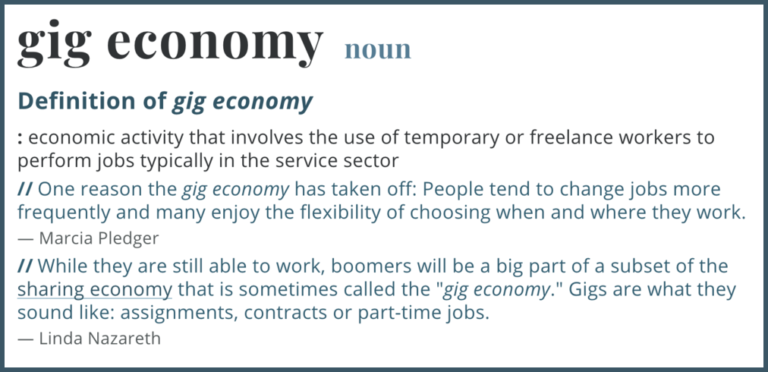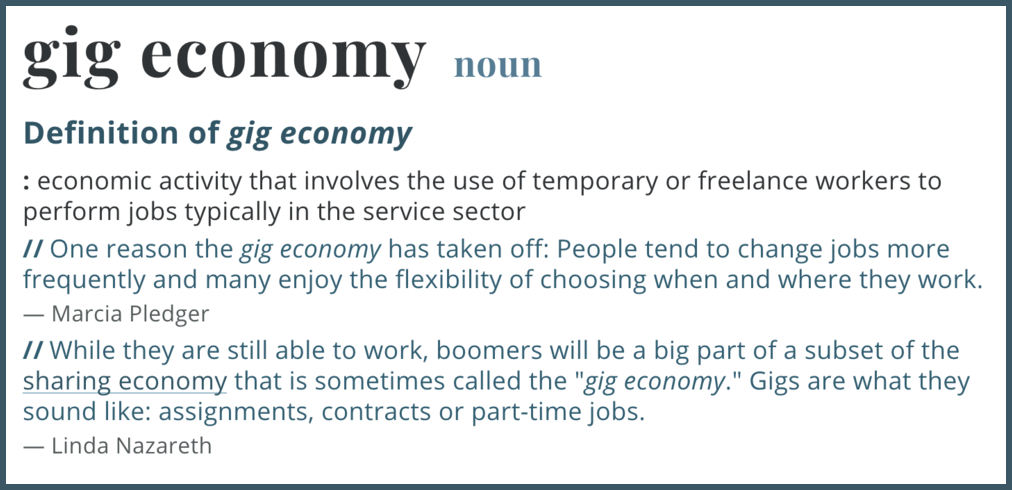‘Gig economy’ is now in the dictionary. How long till they add ‘Thank God It’s Monday’?

It’s a historic day for rise n’ grind entrepreneurs. Merriam-Webster added “gig economy” to its online dictionary, which means it’s finally a real thing.
Of course, for the millions of people who are hustling just to make it rather than hustling for independence, the gig economy was always real. It’s no comfort for the financially insecure that some dictionary editor admits it.
So what does Merriam-Webster say the gig economy is?
Economic activity that involves the use of temporary or freelance workers to perform jobs typically in the service sector.
Right, so all the freelance writers, programmers, and graphic designers are in the service sector?
“Gig economy” doesn’t really describe the actual material conditions people are working in: there just aren’t enough jobs offering full-time, well-paying employment, no matter what you’re doing or how talented you are.
The gig economy IS the economy now.
So even though some people are making enough money to keep your local drinking place in business, tens of millions of people have to endlessly hunt for gigs to make it.
Look at this howler from the definition:
One reason the gig economy has taken off: People tend to change jobs more frequently and many enjoy the flexibility of choosing when and where they work.
-Marcia Pledger
Wait, is the dictionary trying to make it seem like the gig economy is by CHOICE? WTF!
Who would choose to have to work three precarious jobs to make ends meet instead of one consistent job? Very, very few people—and especially not 57 million.
The gig economy is a deliberate creation, not an accidental one. Companies realized they could make more money by creating a shifting army of freelancers who will work furiously and for cheap because most are doing it to survive. Then they can be easily disposed of when their task is done, and have no union to join.
We’ve spent a lot of time covering the state of work and where it’s headed here at The Basis Point, and the dictionary admitting the gig economy exists means something. It’s a deliberate attempt to make it seem like something that just is, and wasn’t created extremely recently.
We’ll be back to report on this again when they add “TGIM” next to the TGIF entry.
And we’ll also be back to address the entrepreneurial element of how the gig economy came to be. I get that many do indeed want to be on their own, so we need to explore that. But I’m still on the side that believes most would prefer the stability of a non-gig economy.
Much more coming on the state of work. For now, here are our recent posts on the topic.
___
Reference:
– We Added New Words to the Dictionary in April 2019 (Merriam-Webster Dictionary)
– The State Of Work 20 Years After Office Space (The Basis Point)
– The Bullshit Lie Of “Thank God It’s Monday” (The Basis Point)
– WTF is “full time freelance” if you only work for one employer? (The Basis Point)
– How Do Finance Companies Sell To & Recruit A Burned Out Generation? (The Basis Point)
– What Workplace Leaders Can Learn From the Real Gig Economy (Gallup)

